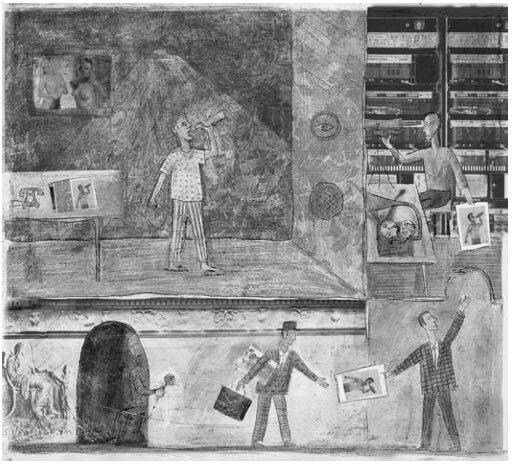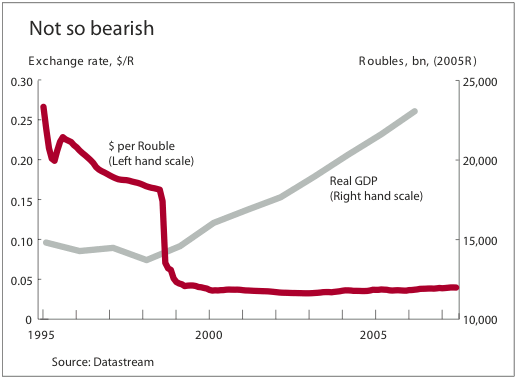Summer 2007
Blat, Kompromat and Siloviki: The Soviet Practices That Oil Russian Business

The Soviet system was not a planned economy. It was meant to be, but those living within its borders found that they had to counteract the over-centralization and ideological limitations of the Soviet régime through intricate schemes of informal exchange, regional and industrial lobbying, and a variety of underhand practices for “beating the system.” In much the same way, the post- Soviet system rarely operates according to its proclaimed principles. Just as before, there is a gap between the formal discourse and the ways in which things get done, and informal practices must regularly be used to compensate for the ineffective formal institutions. In the 1990s, these practices were often spoken about as a necessity for business, but they were also the enactment of know-how that enabled competent players to manage and manipulate the system to their own advantage. Politics and economy today remain dependent on the functioning of informal practices that are widespread, recognized, and reported upon in every region of Russia.
In my previous book Russia’s Economy of Favours I argue that blat (the use of personal networks for obtaining goods and services in short supply and for circumventing formal procedures) has lost its central significance in the conditions of the post-Soviet world. In hindsight, it is perhaps more accurate to say that changes in the political and economic foundations of the state-centralized economy have resulted in the monetization of blat and the reorientation of the use of personal networks toward a new type of shortage—a shortage of money. These changes have also generated a whole new range of informal practices—the focus of my new book How Russia Really Works. It includes practices of black PR in politics, kompromat (the use of compromising material as potential blackmail) in the media, krugovaia poruka (collusion which renders everyone guilty) in professional circles, and a variety of scheming practices in business and law enforcement.
Each evolved to compensate for the defects of the post- Soviet order and helped to reconfigure spheres once dominated by Soviet-era informal practices. I argue that just as blat was essential “know-how” in the Soviet era, these post-socialist informal practices represent the “know-how” of post-Soviet Russia. As such, they are important indicators of Russia’s political and economic development, even more significant in the recent context of increasing centralization and information control.

Source: Source: Datastream
In post-Soviet Russia, ways of “beating the system” (formerly associated with blat favours in health, personal services and education) amount to only a fraction of the overall corruption market 1. Russia’s economy has powered ahead this decade after the post-Soviet stagnation of the mid-1990s and the collapse of the rouble in 1998 (see chart). Unsurprisingly, the vast bulk of bribes in Russia are paid by businessmen for export licensing and quotas, state budget transactions, tax transfers, customs duties, and privatization deals.
One respondent with a diplomatic background explained the catch of the 1990s’ privatization as follows, “Changes have taken place in various degrees in all sectors but their fundamental pattern is Sovietness—the state’s capacity to distribute and to ration. The state used to ration everything and add a little something for nomenklatura [the administrative elite], such as dachas [country houses]. Today, the stakes have gone up: larger possibilities associated with larger risks, but also distributed according to the same logic of authorization from above. Exceptions are rare.”
Re-nationalisation
This pattern seems to be even more pronounced since the “re-nationalisation” trend between 2004 and the present day. The state share in most strategic sectors has increased significantly but we know very little about the forces behind this trend. Admittedly, it is difficult to research informal practices in real time. Their practitioners prefer to discuss this sensitive subject post factum when the schemes and know-how have lost their business appeal. By exploring the informal practices of the 1990s, I illuminate the logic and the mindset behind them— something that does not change much. Today’s informal practices are just as effective and work along similar lines: practices associated with financial scheming and alternative contract enforcement continue advancing individual businesses. They also continue to rely on personal relations, informal networks and other antimarket-type alliances. Yet this does not mean that they remain unchanged. They respond to the challenge of the markets and modern demands. For example, practices of double book-keeping and storing kompromat—which have been in the Russian repertoire for a long time—have been transformed to integrate the international standards of accounting and modern technology.
In fact, such an ability to transform creates another difficulty in trying to catch up with the informal practices. The informal practices rapidly adapt to legal changes and make use of legal institutions. By making the law and legal institutions part of the manipulative schemes the informal practices create further obstacles to the rule of law. They are, then, the outcome of both change and continuity. On the one hand, grounded in Russian custom, informal practices maintain and introduce into economic life forms of reciprocity that inhibit the development of markets.
On the other hand, these practices adapt to present-day economic concerns and become oriented towards the problems of an economy undergoing market reforms. What is characteristic about these informal practices is their double-edged relationship to the “market” and “democracy”: they are supportive but also subversive; they accommodate change but also represent resistance to change; they are beneficial for certain groups but also cater to the needs of the political régime and are implicitly endorsed by the state; and they are divisive in their implications, serving and sustaining insiders at the expense of outsiders.
There are many axioms of post-Soviet business life, such as: all firms work without profit – or taxable profit, at any rate; all firms keep two sets of books; hidden profits pay for bribes and other informal dividends; the informal order is to be respected; one has to make and keep friends; formal institutions are to be avoided by reaching informal agreements with their representatives. In the book, I give many examples of how these apply in practice. It is not that companies work without profit as such but they decide how much profit they report and adjust their accounts correspondingly. In doing so, they follow both the written laws and informal norms and, what’s of crucial importance, they skillfully navigate between them.
Playing the game
To operate in the post-Soviet economy one must sustain Soviet “informal” expertise but apply it to newly-emerging financial institutions, the functions of the security services and to shifting legal frameworks. It is not that the requisite components of the rule of law are absent in Russia; rather, the ability of the rule of law to function coherently has been diverted by a powerful set of practices that has evolved organically in the post-Soviet milieu. These informal practices ‘bridge’ the gaps between formal rules and informal norms in creative ways, differently in different contexts and change once the formal rules change or the pattern becomes too widespread. For outsiders, understanding such patterns is only possible after the fact, if then. For insiders, the commonplaces such as ‘Russia is a country of unread laws and unwritten rules’; ‘nothing is as strong or as weak in Russia as it seems,’ or ‘we acted on our best intentions but it turned out as it always does’ say it all.
To overcome the dependency on informal practices, Russia has to break free from the following vicious circle where:
- The incoherence of formal rules and the consequent opacity of the “rules of the game” (intended or not) compels most Russians, willingly or unwillingly, to violate them.
- Everyone is bound to disregard at least some of these opaque rules, so anybody can be framed and found guilty of some violation.
- So many people (are forced to) break the rules, that punishment becomes a resource in short supply and is bound to occur selectively, i.e. applied “when necessary.”
- Violation of unwritten rules forms a basis of extra-legal criteria for deciding who is punished first. It is thus as important to observe the unwritten rules as the written ones. These extra-legal criteria, combined with the opacity of the “rules of the game”, perpetuate a reliance on unwritten rules in order to keep Russia “manageable”.
Given the dependence of the Russian economy on informal practices, it will not be enough to change the formal rules. Any effort from the top to change the formal rules is perceived on the bottom as yet another constraint to be resolved through (and integrated into) informal practices. This often results in readjustment and reconfiguration of informal practices around the new constraints, rather than a decline in their significance.
A roof over your head
In the 1990s informal practices surfaced as the opportunistic and manipulative use of formal constraints and the possibility of building corporate strategies on this basis. In order to get routine business tasks accomplished companies are compelled to secure a krysha (‘roof’ or protection): to employ individuals and private security companies skilled at both navigating Russia’s complex financial and legal system and mastering the so-called informal negotiation techniques. The former implies professional expertise in the tax code, licensing requirements, insolvency law, accounting and banking procedures in combination with the necessary know-how to manipulate these codes to the firm’s advantage. The latter refers to sophisticated intelligence-gathering capacities and the informal use of detailed files of compromising information (kompromat), including copies of bank statements, currency transfers, business and real estate transactions, and other official documents as well as general correspondence, personal information and unofficial transcripts of telephone conversations.
Rather than restricting their activities to ‘traditional’ tasks such as physical protection and informational security, private security services in Russia have become the de facto administrative force of the economy: their extra-legal activities enable Russia’s imperfect institutional framework to operate. Needless to say, these forces, known as siloviki, have become even more powerful under Putin’s régime, received places on boards of directors of various companies and even acquired new functions in “protecting the business climate in the country” 2.
1 See http://www.indem.ru and INDEM data in “$38 mlrd na lapu,” Vedomosti, May 22, 2002, http://dlib.eastview.com/sourc… (accessed March 22, 2005).
2 Putin urged the Federal Security Service on 31 January to prevent leaks of sensitive political and economic information. President has praised the FSB work and called for provision of a normal business climate in the country and an important security functions during the elections. Putin: FSB to provide normal business climate in Russia, NewsRu, January 31, 2007 at http://www.newsru.com/arch/rus…;
Dr Alena Ledeneva is Reader in Russian Politics and Society at UCL School of Slavonic and East European Studies. She is the author of How Russia Really Works: The Informal Practices that Shaped Post-Soviet Politics and Business, published by Cornell University Press.